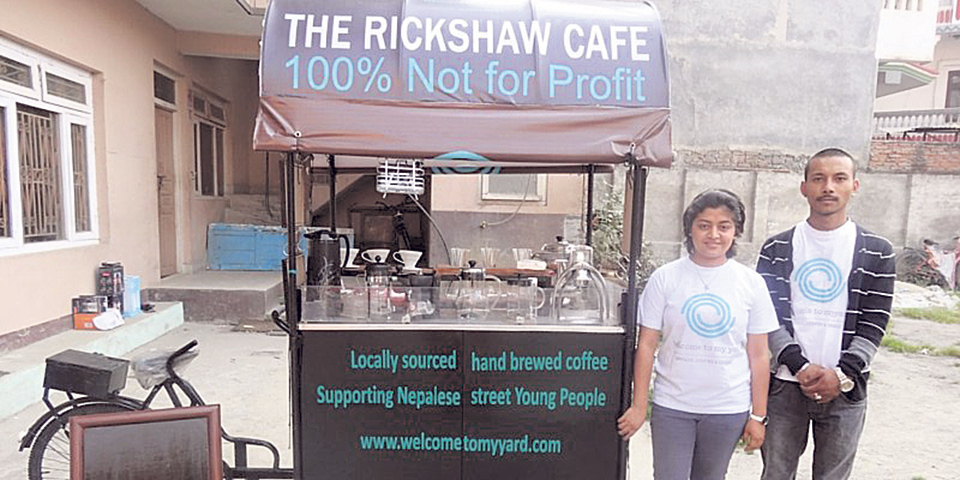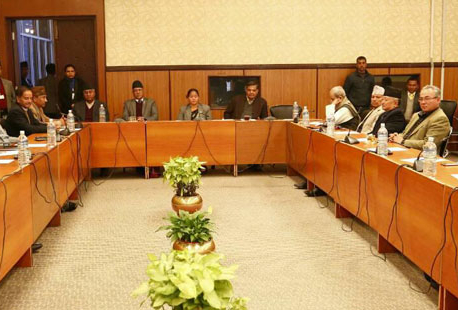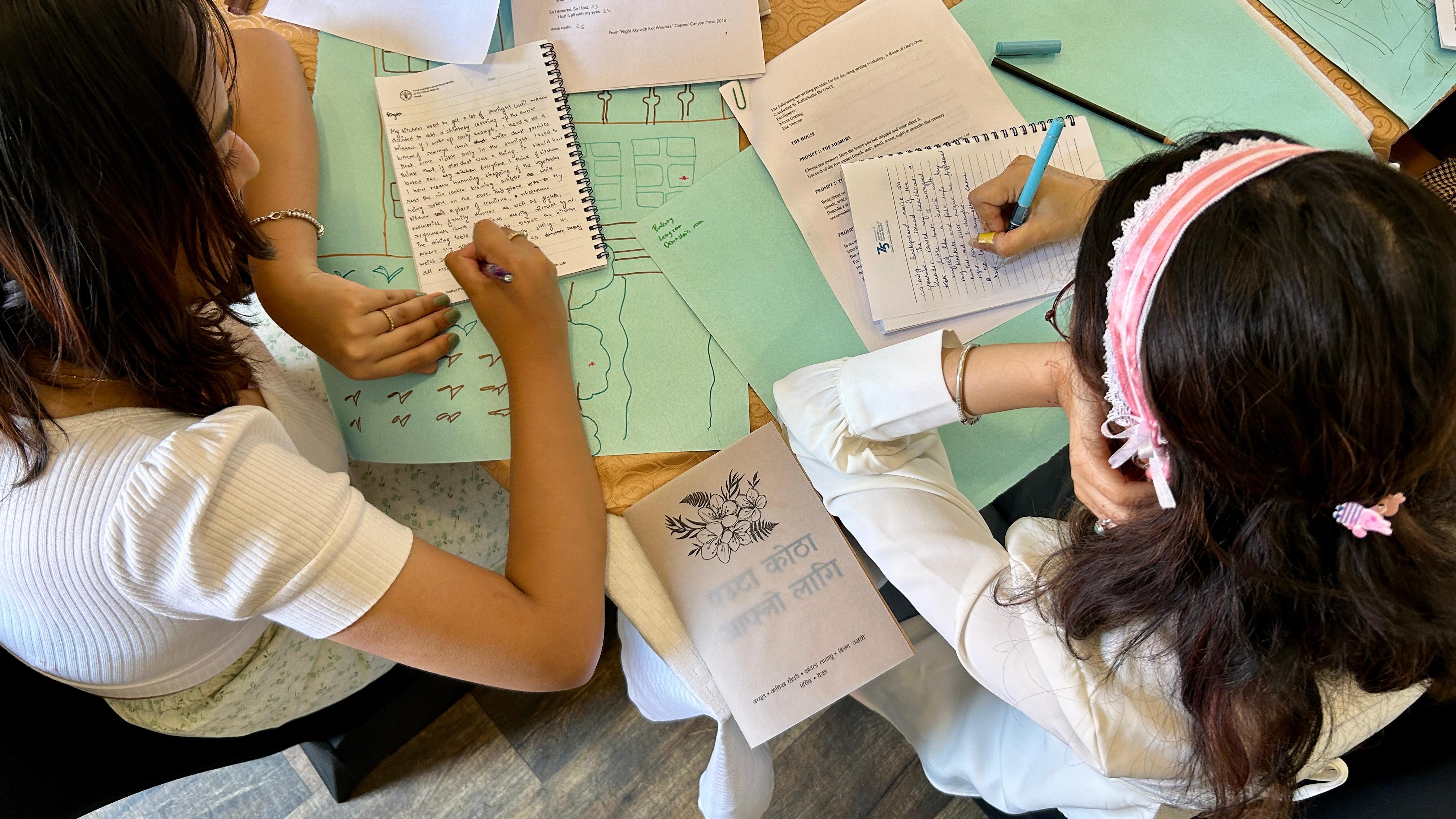
OR

Just a few years ago he lived in the streets of Kathmandu. Today, he makes coffee at Coffee Café in Thamel during the weekdays and at Le Sherpa on Saturdays. Deviram Sharma says his life changed when he met a team from Welcome To My Yard (WTMY) while living on the streets near Pashupatinath temple. They offered him free Barista training, following which he was also assured a job.
“My parents abandoned me the day I was born so I lived with my grandmother till I was nine years old,” says Sharma adding that when his father resurfaced to take him back to the village to make him work, he ran away from with his friends and that was how he ended up in the streets of Kathmandu. “With no education or skills I couldn’t see how I would be able to survive but the barista training came to my rescue,” he says.
Similar is Kopila Thapa’s story. She was 10 years old when her father fell severely ill and her mother became the sole breadwinner of the family. The family was reduced to living on the streets and Thapa, again with neither education nor skills, didn’t know how she could support her family. “Things changed when I came across WTMY and got a free barista training,” says Thapa who now works at a restaurant in Basantapur, Kathmandu. According to Thapa, she makes the “best coffee in the world” and that wouldn’t have been possible without the free training.
Bhakta Chand, program manager at WTMY, says that their aim is to involve, inspire and enable street based children, youth, and families in Kathmandu. WTMY is a social enterprise that aspires to bring about positive change in the lives of children and youth living in the streets of Kathmandu. Imparting practical and theoretical education, skills development training and psychological counseling of the street based families are all vital parts of the program. Currently their focus groups are street children and youth around Pashupatinath temple, Tilganga, Sifal, Boudha, and Kapan.
However, children and youth who are risk of being reduced to living on the streets are also given the opportunity to earn a decent living through their trainings. Srijana Tamang, who now works as a brochure distributer for an online studying app in Thapathali, is one of them. When her mother, being the only earning member of the family, was unable to sustain three children, 19-year-old Tamang desperately needed to do something to provide financial support to her family. So when she heard about the free barista training, she jumped at the chance.
“I had seen posters of coffee outside restaurants. The artistic designs on them had always fascinated me,” says Tamang adding that she was really excited about the free barista training. The training, she says, not only provided her with skills required for a job but brought about a new found confidence in her. “My self esteem was extremely low and I never spoke to anyone before getting the training. WTMY’s psychological counseling sessions played a big role in boosting my morale,” she says. She worked at a café for three months before quitting to pursue a better opportunity.
Apart from providing barista trainings, WTMY also helps street children get employment within the enterprise itself through their programs City Walk and Rikshaw Café. The City Walk comprises of a one and a half hour walk from Thamel to Kathmandu Durbar Square, a three-hour walk along the same route, and a night market walk. It is designed for tourists.
The guide will brief you about exciting cultural histories and the hidden temples of Kathmandu and tell you stories of the local Gods and Goddesses. You will also get to sample some local delights along the way. For the City Walk program, the street kids are provided training with a professional guide. And they get a set wage, transport facilities, and three meals after being employed.
17-year-old Divya Pariya who has never gone to school is now a City Walk guide and earns a decent living for herself. “A friend told me about WTMY and after receiving training from a tourist guide I became a part of the City Walk program,” she says. She uses the money that she gets from the walks to buy books and stationeries. She is now learning to read and write.
While most organizations in Nepal aimed at bringing radical change in the lives of poor and homeless, Sarah Reyes, founder director of WTMY, wanted an incremental yet long-lasting impact. “Our team empowers street children and youth through three different stages,” explains program manager Chand. “The first stage comprises of social work programs, the second stage is educational and vocational training programs, and the last phase involves social business programs that carefully grooms these children and helps them in finding employment,” he says.
The social work program organized by WTMY provides a soft entry into the organization for those living on the streets. The social work team strongly focuses on psychological counseling, organizes medical programs and creates various sports clubs for children. “Psychological counseling is usually done on the field. We provide individual counseling to the victims in special cases such as that of HIV aids or sexual abuse,” says Mandira Chaulagain, the social work team lead, explaining that the team also conducts group-counseling sessions to make street kids understand the importance of basic education, and also make them aware about child trafficking.
“Rehabilitating these children in orphanages or community homes negatively affects their psychology due to the sudden change in environment so we make sure that these children grow out of the streets on their own,” says Chaulagain.
Once they are familiar with the volunteers and staff of WTMY, the second step is to give them education or vocational training like barista, mechanical or tailoring courses. WTMY engages them in informal, ‘bite sized’ courses that help them in practical learning. The program familiarizes this marginalized group with subjects such as Mathematics, IT, and English.
“It is extremely difficult for us to get them to our center and provide them with the required trainings,” says Chand. “So we also provide them with daily wage for receiving the training,” he continues. However, the ‘wage’ is kept in the savings account by WTMY and in case where the children don’t have proof of identity and can’t open a savings account, the organization keeps a tally of each person’s savings that the children can periodically check. “The money can only be used for education, trainings, or business,” adds Chand, explaining that they also provide loans if they wish to start their own small business.
The last phase is the social business programs that include making their resumes and preparing them for job interviews. The organization’s responsibility doesn’t end when they find a job. These people are once again given money management and family management trainings.
WTMY has its own pedal powered mobile café – Rickshaw Café – that provides locally sourced coffee in Kathmandu. Chand informs that this was started to give employment to those young people who have received barista training. This café is what WTMY calls ‘shop positive’. Every single rupee of the profit goes back to the welfare of the street children. “You can also book the Rickshaw Café for weddings and other functions,” says Chand.
WTMY’s aim is to enable kids and youth who have been forced to live on the streets to become active and integral members of our communities. And people like Sharma and Thapa say that though they don’t know to what extent the organization has been successful in meeting its aim, it has managed to bring hope in their once hopeless life, and that is a good start.
You May Like This

Discussion on youths' role in peace building
On the occasion of International Youth Day 2017, the Global Peace Youth Corps Nepal (GPYC Nepal ) conducted a discussion... Read More...

Seven-party meeting underway at parliament building
KATHMANDU, Dec 26: A meeting of seven political parties summoned by Speaker Onsari Gharti Magar has started at parliament building... Read More...

Fire in residential building kills 8 in India
NEW DELHI, June 30: Police say a fire in a pharmacy engulfed residential quarters of a Mumbai suburban building, killing eight... Read More...



Just In
- By-elections: Silence period starts from today, campaigning prohibited
- A Room of One's Own- Creative Writing Workshop for Queer Youth
- Tattva Farms rejuvenates Nepali kitchens with flavored jaggery
- Evidence-Based Policy Making in Nepal: Challenges and the Way Forward
- Insurers stop settling insurance claims after they fail to get subsidies from government
- Nepal-Qatar Relations: Prioritize promoting interests of Nepali migrant workers
- Health ministry to conduct ‘search and vaccinate’ campaign on May 13
- Indian customs releases trucks carrying Nepali tea, halted across Kakarbhitta














Leave A Comment